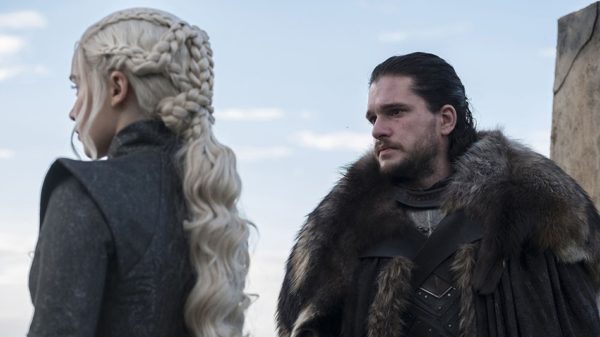Television Commentary: Martin v. Tolkien
By Harvey Blume
Is it all, from here on out, to be about Daenerys v. John Snow for the Iron Throne?

Will Jon Snow plunge a sword into the heart of his beloved to save the world? Photo: HBO
Game of Thrones, season 8 episode 3, the big battle, dragon ripping at and burning dragon, Daenerys finally wielding a sword, Melisandre helping to defend the living before walking out into the snow and dying, fierce Arya stabbing the Night King in the gut and killing him, which even dragon flame could not do.
Viewers may well think back to the Return of the King, and that battle, beginning as a suicidal action, outside the gates of Mordor.
When the Night King dies, all his creatures, including a dragon, disintegrate. When the One Ring is immolated, Sauron withers into smoke, his colossal battlements collapse, and his armies throw down their weapons and scatter.
Lord of the Rings went nowhere when Sauron was gone. Elves, wizards, and all who had worn the Ring, sailed away from Middle-Earth. The epic and the magic went with them. We were left with hobbits in their enduring if not alluring domesticity. Perhaps Tolkien valued this return to what his buddy C.S. Lewis called Little England.
But the serious admirer of Tolkien’s opus may not feel so gratified. This conclusion is, as I am not the first to notice, a disappointing foreclosure.
But what about GoT?
Are we back to mere dynastic squabbles after beating off nothing less than the massed and well led forces of death? Is it all, from here on out, to be about Daenerys v. John Snow for the Iron Throne? How wretchedly dull that would be.
Martin always has Tolkien in mind. There would be no GoT without Maritin’s admiration/cum critique of Tolkien. Part of Martin’s critique has to do with Tolkien’s great strength, his long narrative arc. The downside of this, for Martin, is that Tolkien leaves nothing imperfect or of narrative interest in the end.
The suspense in the next episodes is not about how the living will fare in the war against the dead — that’s been decided — but how well Martin translates his critique of Tolkien into the conclusion of his saga.
Seeing Lord of the Rings as backdrop for GoT enriches the appreciation of both. But GoT can stand on its own, even if, in this case, the video is superior to the book.
Harvey Blume is an author—Ota Benga: The Pygmy At The Zoo—who has published essays, reviews, and interviews widely, in The New York Times, Boston Globe, Agni, The American Prospect, and The Forward, among other venues. His blog in progress, which will archive that material and be a platform for new, is here. He contributes regularly to The Arts Fuse, and wants to help it continue to grow into a critical voice to be reckoned with.
